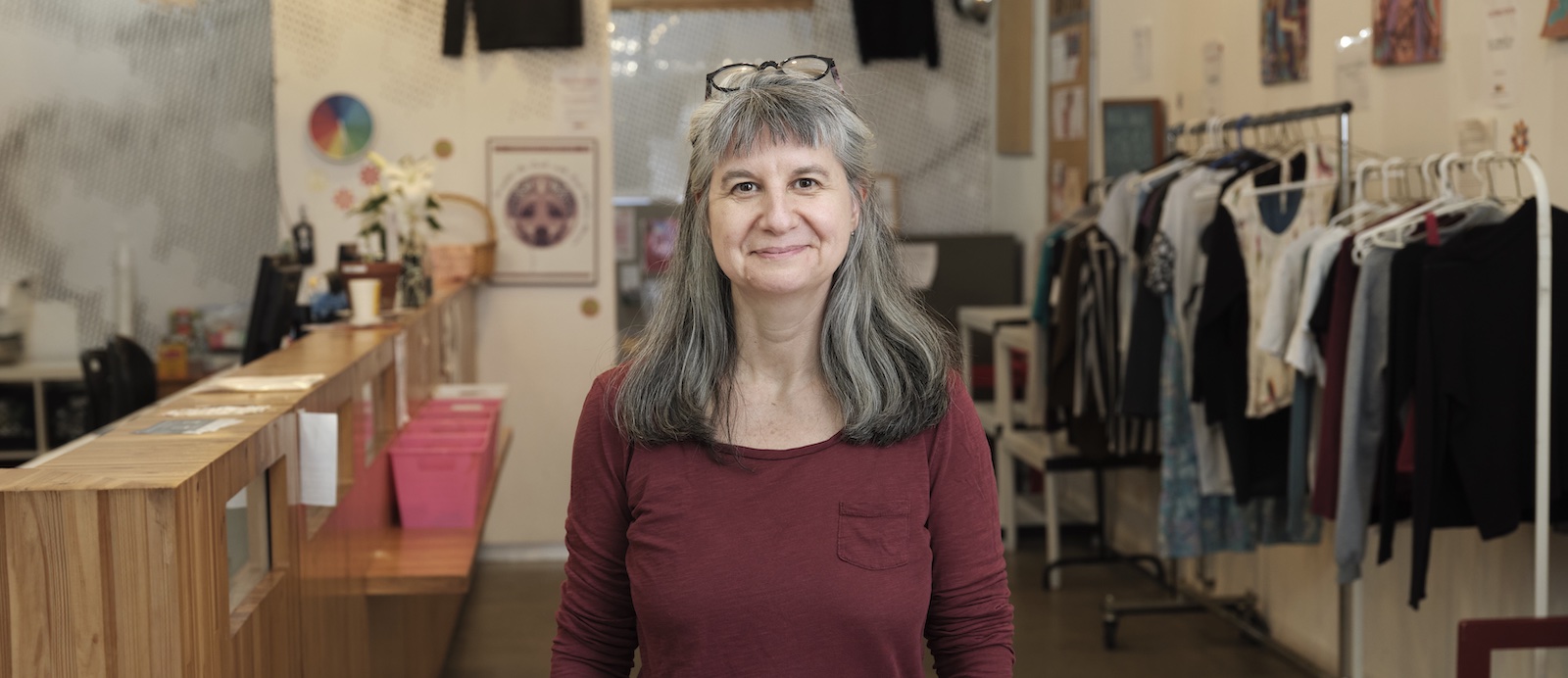
Change Can Happen. Profiles in community leadership: France-Emmanuelle Joly
Central City Foundation is once again celebrating examples of extraordinary community leadership. We are highlighting the dedication and determination of those whose support for community-led solutions helped people in our inner city and beyond and have demonstrated that change can happen in our community. As part of this celebration, we have asked each of our profiled leaders to share with us their thoughts on leadership, community, and their relationship with Central City Foundation.
France-Emmanuelle Joly, Executive Director, Vancouver Women’s Health Collective
France-Emmanuelle is a feminist leader and tireless advocate for equity and inclusion. Her steadfast commitment to centre the voices of all women and gender-diverse people has helped to ensure that services and supports in our community truly meet their needs.
Q: How does your organization help address the conditions faced by people in the inner city?
The VWHC (Vancouver Women’s Health Collective) strives to keep alive the belief that founding members converged around five decades ago: women are the experts when it comes to their health and wellness. As our mandate states, we value shared knowledge and have been more recently focusing on centring the voices and agency of folks marginalized in gender in the inner city. We aim at filling the gap and countering the disproportion in services for vulnerable genders.
Q: How would you describe some of the common lived experiences, systemic inequalities/inequities and other challenges faced by the people you work with?
The common lived experience is living in precarious and at-risk situations. These situations may include lack of or unsafe housing, irregular income, gender-based violence, stigma, self-harm, substance misuse, food insecurity, intergenerational trauma and the impact of residential school. Folks have limited access to agency and decision-making levels, and current systems of assistance maintain people in precarious situations.
Q: How would you describe the importance of community connections and a sense of acceptance and belonging for the people you work with?
Community connections, acceptance and belonging are basic human needs that build each person’s self-worth. The inner city is a tightly knit community where people care, nurture and protect each other. Community members who come to VWHC appreciate feeling seen, remembered, welcomed, valued, validated, and having a voice through peer programs, advisory committees, and sharing circles. We do our best to interact from a strength-based approach and “give a yes” whenever possible.
Q: Looking ahead, can you share with us some of your thoughts about where you see that change can happen?
Change starts within each person and must be supported by commitment at the highest levels of decision-making. We cannot undo systemic inequities without a clear message and shift in attitudes, actions, and accountability in government, corporations, NGOs and NPOs. Leading isn’t so much about having things go in one’s preferred direction. It’s about ensuring things go in the direction affected people want them to go in. I see change in community members more often than I see change within those who are in positions of power. In a way, that’s good. It’s true to VWHC’s grassroots collective practice.
Q: What are some examples that give you hope for a better future for the people with who you work?
I believe in growing capacity in others so they can advocate for themselves. Participants in our counselling program, as well as peers leading our Gender-Based-Violence Mapping project, are living examples that with a relationship-based approach, growth or “(re)finding my power” (as per participants) can happen in anyone. We also hear from our volunteers about how their experience at VWHC is shaping their future work, their values and community involvement.
Q: How would you describe the value of developing relationships and collaboration in your work and organizations like Central City Foundation?
Collaborations and relationships are a way to cover more ground. Ideally, we would always have time to create and nurture connections with other organizations, supporters, and influencers. Yet, time can be an elusive luxury in social justice work. CCF acts as a connector to create opportunities or bring like-minded individuals and groups together.
Q: What is it that you value most about being a community-partner of Central City Foundation?
What we value the most about being a community partner of CCF is knowing that there is a funder who cares and is willing to listen, be nimble, and provide support where it is most needed, in the form most needed.
Q: What has support from Central City Foundation meant for your organization?
Very literally, keeping the doors open as a social purpose real estate tenant! Beyond that, Jennifer’s vision for creating collaboration and her amazing networking skills are an inspiration. Central City Foundation is also a voice in allyship that disseminates anti-oppressive messages and raises awareness of challenges faced by folks in the inner city at levels VWHC may not reach.
Q: Do you have a call to action for our CCF community that you would like to share?
I’d like everyone to remind themselves that each individual is a human being with needs, not just (bad) behaviours. People may be the result of their choices, yet options afforded to each individual vary greatly based on the privilege (or absence of) they are born into or have access to through life circumstances. Use an intersectional lens when making daily decisions in personal, professional, and social settings.
 Previous story
Previous story
